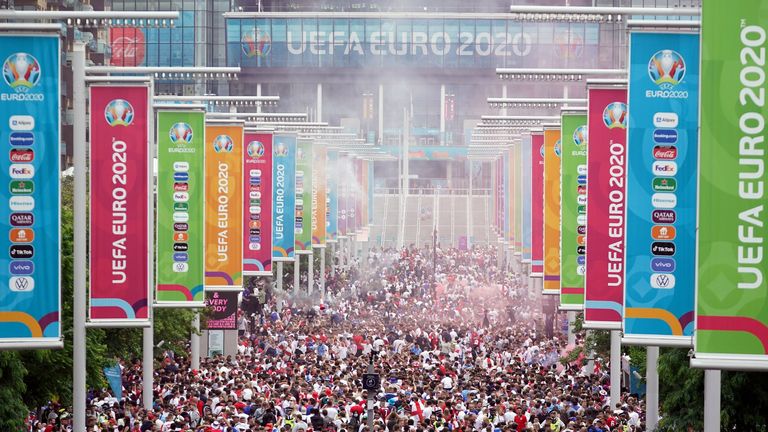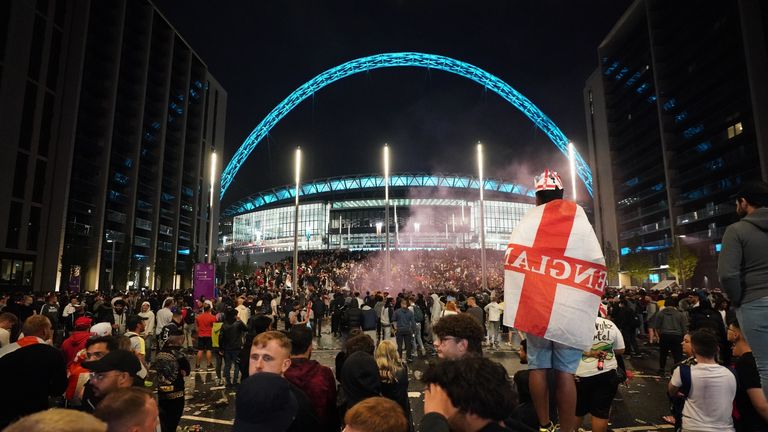
Fan disorder which marred the Euro 2020 final at Wembley was a “near miss” of fatalities and a “source of national shame”, an independent review commissioned by the Football Association has found.
The review carried out by Baroness Louise Casey of Blackstock found that approximately 2,000 ticketless fans gained entry to the stadium, of which around 400 were ejected, for the showpiece between England and Italy on July 11.
It noted entry to the stadium was through 17 “mass breaches” of disabled access gates and emergency fire doors, which “jeopardised the lives of legitimate supporters and staff”.
Baroness Casey found a “collective failure” by organisations in the preparation for the stature of the match.
“We are genuinely lucky that there was not much more serious injury or worse, and need to take the toughest possible action against people who think a football match is somehow an excuse to behave like that,” said Baroness Casey.
“I am clear that the primary responsibility for what went wrong at Wembley that day lies with those who lost control of their own behaviour that day, not with anyone who did their best but lost control of the crowd.”
Alcohol and drugs were a key factor in the disorder as fans arrived at the stadium up to eight hours before the 8pm kick-off.
In one “appalling incident”, a ticketless fan tried to impersonate a steward and hijack a disabled child, and separated him from his father in order to trick his way through a pass gate.
Baroness Casey’s report found the ongoing need to manage the Covid-19 pandemic and the euphoria around the men’s national team reaching their first final since 1966 combined to create a “perfect storm”.
A loss of experienced stewards as a result of the pandemic left Wembley’s stewarding operation “vulnerable”, while the police and other agencies were denied a key crowd management tool with the absence of fan zones.
The review found the Metropolitan Police made repeated requests to the government for such a zone to be set up.
A penalty shootout victory by England could have resulted in a further huge public safety risk, the review identified, with up to 6,000 ticketless fans waiting to storm the stadium at the same time as doors were being opened to allow other fans to leave.
An official from the London emergency services said the consequences of an England win would have been “horrific”, and that a major incident would have been declared at Wembley and in central London.
Baroness Casey said the knowledge that about 25,000 of the national stadium’s 90,000 seats would be vacant, due to Covid-19 restrictions, contributed to the events that unfolded.
The report also discussed how Wembley’s staging of the semi-finals and final was in doubt due to UEFA’s desire for a bigger attendance, with Budapest under active consideration at the time due to Hungary having no Covid-19 regulations.
FA ‘fully accepts’ review findings
Football Association chief executive Mark Bullingham said the organisation apologised for the “terrible experience” many suffered within Wembley.
“We fully accept its findings and there are important learnings for us, as well as other agencies involved,” he added.
“The lessons learned from this review will ensure that fans have a good experience at major international events at Wembley, as they have for many years.”
Asked about the difficulties of putting in place a ‘ring of steel’ around Wembley, replicating those often seen at other stadiums around the world, Bullingham said: “We think it is possible to put in place a different kind of outer security perimeter and further measures.
“We don’t believe that that would have prevented happening what happened on the day. We believe that’s far more about fan behaviour and that’s the fundamental issue to address.”
In an interview to Sky Sports News, Bullingham added: “There is a broader societal issue but we as football do have the ability to positively influence society and we should take that opportunity.”
FA called to launch campaign to bring about ‘sea change’ in supporter attitudes
Baroness Casey made five recommendations for national consideration.
The first called on the government to consider a new category for matches of national significance, with enhanced security measures and stricter policies around the sale and consumption of alcohol.
It called for a review of stewarding, and for who is accountable in ‘Zone Ex’, the area immediately around the stadium, tougher penalties for individuals found guilty of football-related disorder and an FA campaign to bring about a “sea change” in attitudes among supporters.
England players Marcus Rashford, Jadon Sancho and Bukayo Saka were racially abused on social media after the game.
Baroness Casey wrote: “Finally, the biggest challenge I lay down is around the culture that led some individuals on the day at Wembley, and in the days after on social media, to choose to behave in this way.
“What makes people believe that it is somehow acceptable to break into a stadium or abuse disabled entrances just because it is a big match or there are spare seats inside?
“Why on earth should black footballers be expected to continue to play for their country amid racist abuse from their own countrymen?”
A more joined-up approach between Wembley and the Metropolitan Police Service to managing public safety on match-days is among the recommendations proposed to the FA, Wembley and key partners.
Bullingham added: “Collectively we must never allow this to happen again. Baroness Casey is clear that moving forwards, where there is an event of national significance, we and all agencies must view it through a different lens.”
The FA has already been sanctioned by UEFA over the disorder and must play their next home UEFA competition game behind closed doors, with a further match suspended, and they were also fined €100,000 (£84,560).
UK Sport has denied the disorder has irrevocably damaged England’s possible bid to host the 2030 World Cup.
‘National shame’ of Euro final was a ‘near miss’ for fatalities
Source: Healthy Lifestyle



Mga Komento
Mag-post ng isang Komento